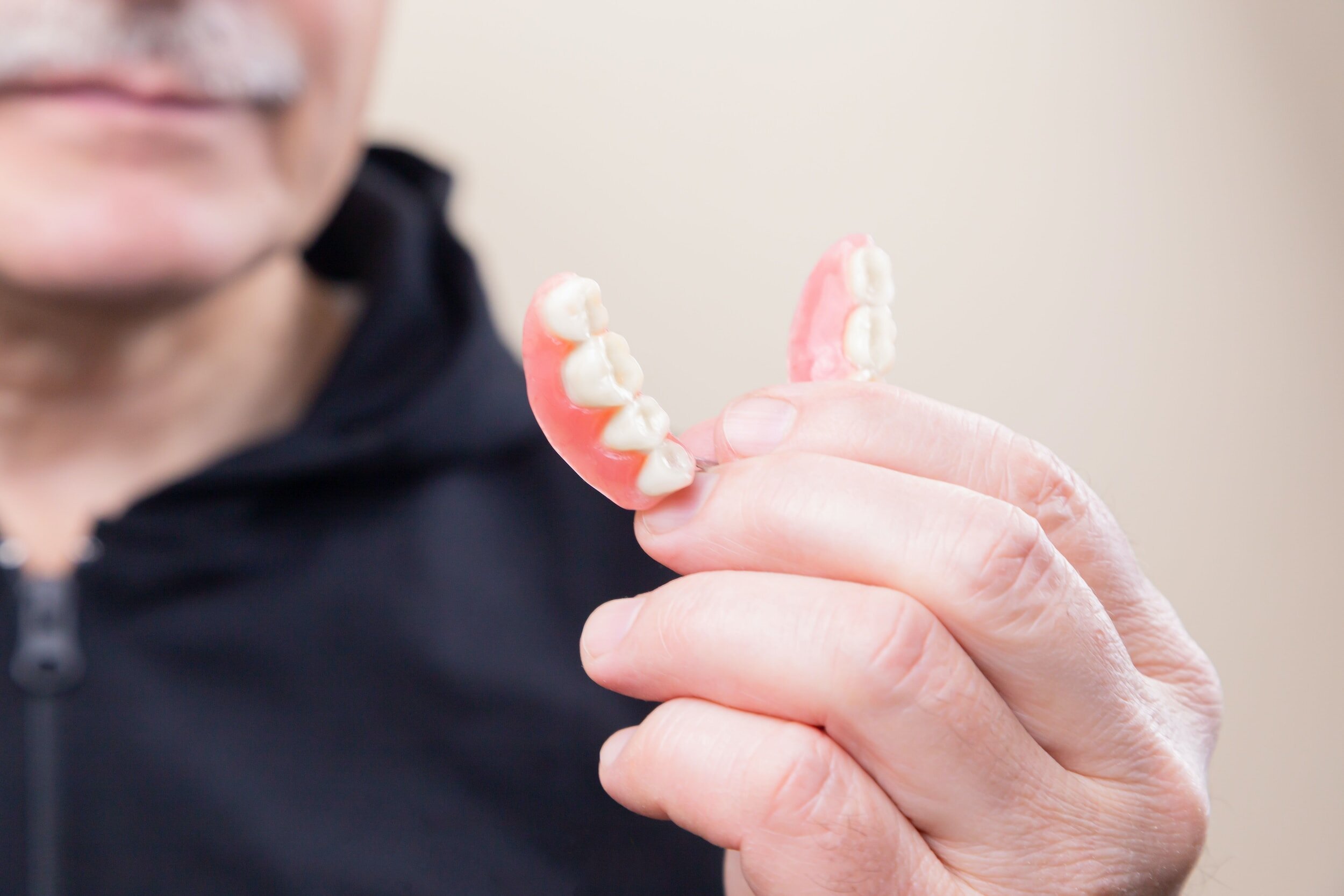
Full and Partial Dentures in Austin, TX
Rediscover your beautiful smile with the best Full and Partial Dentures at Goehring Dental in South Austin, TX.
Dentures are a fast and affordable method of smile restoration.
But when they’ve been badly made, they can rapidly accelerate the process of resorption, or loss of bone mass in the jaw. If you’re looking to restore a few teeth or at least one full arch, your dentures should be designed and crafted with care.
That’s why you should choose a skilled Austin, TX dentist from Goehring Dental. Learn how our dentists will carefully and skillfully design your new smile by dialing (512) 892-8822 or reading the comprehensive guide below.

What Are Full and Partial Dentures?
Full and partial dentures are removable dental appliances crafted to replace one missing tooth or multiple missing teeth, restoring functionality, aesthetics, and oral health.
Full Dentures
Full dentures, also known as complete dentures, are designed to replace an entire set of teeth. Complete dentures are typically made from acrylic resin, with the base resting directly on the gums. The artificial teeth are composed of materials like porcelain or acrylic.
There are two primary types of full dentures:
Conventional full dentures are crafted and fitted after removing the remaining natural teeth, ensuring a precise fit once the gum tissues have fully healed.
Immediate full dentures are prepared in advance and inserted immediately after natural teeth extraction, so you have teeth during the healing period. However, adjustments are required as the gums heal and reshape.
Partial Dentures
In contrast, removable partial dentures are utilized when some natural teeth remain in either the upper or lower jaw. These appliances consist of replacement teeth attached to a metal or acrylic framework, custom-made to fit around existing natural teeth.
Partial dentures are commonly made from acrylic resin, with replacement teeth crafted from various materials, including porcelain or acrylic. Removable partial dentures have replacement teeth attached to a gum-colored plastic base and are connected to natural teeth using metal clasps or precision attachments.
Benefits of Full and Partial Dentures
Dentures offer several benefits that contribute to improved oral and dental health, functionality, and aesthetics.
Restored Functionality: Dentures restore essential oral functions such as biting, chewing, and speaking, enabling individuals to enjoy a more varied diet and communicate effectively.
Improved Aesthetics: Dentures enhance facial appearance by providing support to the lips and cheeks, preventing the sunken look associated with missing teeth. This contributes to a more youthful and aesthetically pleasing appearance.
Boosted Confidence: Restoring a full set of teeth, whether through full or partial dentures, often increases self-confidence. You can feel more comfortable smiling, talking, and engaging in social activities.
Preventing Oral Health Issues: Dentures help prevent potential oral health issues associated with missing teeth, such as shifting of remaining teeth, changes in bite alignment, and difficulties in proper oral hygiene practices.
Customizable Options: Dentures are customizable to suit each patient’s preferences and requirements. Whether full or partial, they can match the natural color, shape, and alignment of existing teeth for a seamless and natural look.
Versatility of Partial Dentures: Partial dentures offer a versatile solution for individuals with some natural teeth remaining. They can address specific tooth replacement needs, contributing to a more tailored and effective restoration.
Affordable Tooth Replacement: Dentures, particularly partial dentures, provide a more affordable tooth replacement than alternatives like dental implants. This affordability makes them a practical choice for individuals seeking effective and budget-friendly solutions.
Preservation of Facial Structure: Full dentures contribute to the preservation of facial structure by supporting facial muscles. This support helps prevent the sagging and aging appearance that can result from the loss of natural teeth.
Non-Invasive Solution: Dentures offer a non-invasive tooth replacement option, making them suitable for individuals who may not be candidates for more complex dental procedures.
Enhanced Quality of Life: Overall, restoring oral function, aesthetics, and confidence with dentures can enhance quality of life. You can enjoy improved oral health and well-being, positively impacting daily activities and social interactions.


Who Qualifies for Full and Partial Dentures?
➤ Complete Tooth Loss
Those who have experienced complete tooth loss in the upper or lower jaw are candidates for full dentures. This may be due to factors such as advanced tooth decay, severe gum disease, or trauma.
➤ Partial Tooth Loss
Patients with some remaining natural teeth can qualify for partial dentures. These prosthetics can fill gaps created by replacing missing teeth while accommodating existing natural teeth.
➤ Adequate Gum and Jawbone Health
Both dentures and partials require a healthy foundation. Adequate gum health and a stable jawbone are essential for final denture fit and functionality. In some cases, patients need preliminary treatments to address gum disease or bone loss.
➤ Commitment to Oral Health
Individuals seeking dentures should be committed to maintaining good oral hygiene. Regularly cleaning dentures, oral tissues, and any remaining natural teeth is crucial for preventing complications and ensuring the longevity of the prosthetics.
➤ Physical and Emotional Health
Candidates should be in good overall health, both physically and emotionally. This ensures that they can adapt to the changes associated with wearing dentures and actively participate in their oral care.
➤ Willingness to Follow Care Instructions
Qualifying individuals should be willing to follow care instructions. These instructions may include proper cleaning, regular check-ups, and adjustments as needed for optimal denture maintenance.
➤ Realistic Expectations
Individuals considering dentures should have realistic expectations regarding the appearance, function, and adjustment period associated with wearing prosthetics. Open communication with the dental team helps manage expectations and ensures patient satisfaction.
The Full and Partial Dentures Process
➤ Consultation
The denture process typically lasts a few weeks and begins with a consultation with one of our Austin dentists. During this appointment, our dentist will evaluate your oral health, discuss the reasons for considering dentures, and outline potential treatment options. X-rays and impressions can help us assess the existing teeth and gum health.
➤ Extraction (If Needed)
If full dentures are recommended and the remaining natural teeth need dental extraction, we’ll plan and perform the extractions. The extraction process is carefully managed to minimize discomfort, and patients may receive temporary (immediate) dentures during the healing period.
➤ Design
Once we’ve prepared your mouth, the design phase begins. For full dentures, your dentist will take detailed impressions of your teeth and gums, and for partial dentures, impressions are taken, along with measurements of the remaining natural teeth.
➤ Fitting
After the initial design, we’ll create a prototype or wax model of the dentures. This allows us to assess the fit, appearance, and function before crafting the final version. Adjustments can be made at this stage to ensure optimal comfort and aesthetics.
➤ Finalization and Production
Once the prototype is approved, the final dentures are produced. Full dentures are typically made from acrylic resin, while partial dentures may have a combination of materials, including metal and acrylic. The production process involves precise craftsmanship for a comfortable fit and a natural appearance.
➤ Fitting and Adjustments
When the final dentures are ready, you’ll return to Goehring Dental for a fitting. Our dentist will ensure that the dentures align properly, provide proper support to the facial structure, and allow for natural oral functions. We may make adjustments to address any discomfort or pressure, ensuring an optimal fit.
➤ Education and Care Instructions
During the fitting appointment, your Austin dentist provides education on caring for the dentures. This includes cleaning procedures, proper storage, and daily maintenance. Patients are advised on the importance of regular check-ups to monitor the condition of the dentures and make any necessary adjustments.
➤ Follow-Up Appointments
After the initial fitting, follow-up appointments are scheduled to address any issues that may arise. These appointments allow for additional adjustments if needed and allow your dentist to assess their performance and comfort.
➤ Adaptation Period
Patients may experience an adaptation period during which they get accustomed to wearing dentures. Speech and eating habits may temporarily change, but most adapt successfully to their new oral appliances.


Caring for Full and Partial Dentures
Dentures require ongoing care to ensure longevity and effectiveness. Here’s a list of tips on how to ensure your dentures work their best:
Brushing: Use a soft-bristled denture brush or toothbrush to clean the dentures. Gently brush all surfaces of the dentures, including the teeth, using a denture-specific cleaner or mild dish soap. Make sure to clean the areas where the dentures come into contact with the gums and palate.
Soaking: Soak the dentures in a denture cleaning solution or warm water when they are not being worn, typically overnight. Follow the manufacturer’s instructions for the specific product. Avoid using hot water, as it can warp the dentures.
Be Cautious: Handle dentures carefully, avoiding dropping them, which can cause damage. Consider placing a towel or a basin of water in the sink when cleaning or handling the dentures to cushion any accidental falls.
Rinsing: After cleaning, thoroughly rinse the dentures under running water to remove any remaining cleaning solution or debris.
Maintain Oral Health: Clean the mouth, gums, and remaining natural teeth thoroughly, even when wearing dentures. Use a soft-bristled toothbrush to clean the tongue, gums, and palate.
Rest Periods: Allow the mouth and gums to rest by removing the dentures for at least a few hours each day. This helps prevent irritation and allows for natural stimulation of the oral tissues.
Proper Storage: When not in use, keep the dentures moist by storing them in water or a mild denture cleaning solution. Avoid leaving them to dry out, as this can lead to changes in shape and fit.
Avoid Harsh Chemicals: Keep dentures away from harsh or harmful chemicals and extreme temperatures. Avoid using bleach or abrasive cleaners, as these can damage the denture materials.
Regular Check-ups: Schedule regular dental check-ups to have the dentures professionally cleaned and examined. This allows our dentist to detect any issues early and make adjustments, ensuring the dentures fit properly.
Adjustments and Repairs: If the dentures become loose, chipped, cracked, or uncomfortable, do not attempt to adjust or repair them yourself. Contact our Austin dentists for professional adjustments or repairs.
Frequently Asked Questions for Full and Partial Dentures
-
Initially, dentures might feel uncomfortable or bulky as the mouth adjusts. With time and proper adjustments, most become accustomed to wearing dentures without discomfort.
-
The lifespan of dentures varies, but on average, they last around five to seven years. Over time, changes in the mouth’s shape and wear on the denture materials might necessitate replacements or adjustments.
-
Insurance coverage for full dentures and partial dentures varies by individual dental insurance plans. While many plans do offer coverage, the extent and limitations differ. Contacting the insurance provider or reviewing the policy details can clarify the coverage, copayments, and any waiting periods. Dentists can also provide guidance on navigating insurance benefits for denture procedures.
-
While it’s possible to sleep with dentures, it’s highly recommended to give the gums and mouth tissues a rest by removing dentures at night. This helps prevent irritation and allows for natural stimulation of the oral tissues.

Ready to rediscover your smile’s beauty and function?
Embrace the personalized care and skillful artistry of Goehring Dental in Austin, TX. Our experienced dentists excel in crafting exceptional full and partial dentures designed to provide you with confidence and comfort.
Dial (512) 892-8822 or contact us online to request an appointment. Our dentists can meticulously design and restore your smile, ensuring quality and care at every step.




